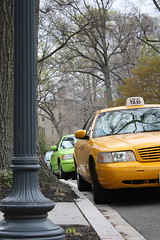Opposition to taxi medallions mounts
 On Thursday, July 7, ANC 1B will discuss and likely adopt a resolution (appended below) opposing the proposed taxi medallion system recently proposed by several councilmembers. The medallion bill, written by lobbyist John Ray at the behest of some of the city’s big taxi magnates, seeks to halve the number of taxis in the city.
On Thursday, July 7, ANC 1B will discuss and likely adopt a resolution (appended below) opposing the proposed taxi medallion system recently proposed by several councilmembers. The medallion bill, written by lobbyist John Ray at the behest of some of the city’s big taxi magnates, seeks to halve the number of taxis in the city.
The issue came up in the ANC because many independent taxi owners live in the Pleasant Plains neighborhood and view the bill as a means by big taxi companies to force them out of the business.
The ANC 1B Transportation Committee held its inaugural meeting to discuss the bill and how it would impact taxi service for drivers and for passengers, i.e. the public.
Commissioner Tony Norman (ANC 1B10 – Pleasant Plains) proposed the committee adopt his draft resolution opposing the bill. Mr. Ray, the bill’s chief lobbyist, was invited to attend but did not.
The Transportation Committee did, however, agree that the industry needs reform, but that this particular medallion bill is fundamentally flawed to the degree that it will harm the public. The committee agreed to add to the resolution a clause expressing the need for meaningful taxi reform.
Radio reporter Pete Tucker, who hosts a radio show on taxi issues, recorded much of the meeting and aired select quotations on the June 19 episode of his program.
(Mr. Tucker himself became news at the DC Taxicab Commission meeting the week after the Transportation Committee meeting. The U.S. Park Police, at the behest of the commission’s Chairwoman Dena C. Reed, arrested Mr. Tucker and other journalists for recording at the commission’s June 22 hearing.)
* * *
Left for LeDroit sees the bill as a wolf in sheep’s clothing, conflating real taxi reform with a severe reduction in the number of taxis. The bill places costly barriers to entry for independent cab drivers and will likely lead to one or two cab companies holding all of the medallions.
Real reform includes mandating and enforcing a minimum quality of service. This means ensuring the cabs are clean and air conditioned and that they accept credit cards. Furthermore, the city should consider GPS tracking to alert customers with smartphones as to the availability of nearby taxis. Furthermore, a centralized dispatching system should aid consumers looking to schedule a trip.
Medallions, however, are a deliberate attempt to limit competition. This is ultimately bad for the public. After New York, Washington is the easiest American city in which to hail a cab and the ability to do so aids our quality of life and increases our diversity of practical transportation options.
* * *
Here is the resolution the committee adopted and which the ANC will discuss on July 7:
WHEREAS: The Council for District of Columbia is contemplating an overhaul of the taxicab system by proposing a medallion system for taxicabs in the District of Columbia; and
WHEREAS: There is a clear and present need for the Mayor of the District of Columbia and the Council for the District of Columbia to review and propose objective reforms in the present taxicab system, in terms of taxicabs being modernized, i.e. energy efficient, gps, air conditioning, credit cards and drivers knowledge of best routes; and
WHEREAS: The present number of taxicabs in the District of Columbia is over 9,000, the proposed medallion system would place an arbitrary cap on the number of taxicabs at 4,000, this restricts the supply and creates barriers to competition; and
WHEREAS: The District of Columbia Chief Financial Officer’s Office studied in 2010 how the taxicab medallion system worked in other major cities and the study concluded that the system would result in windfall profits for a small group of people; an overall decline in service with longer waits and higher fares, create a system more amenable to corruption in the District of Columbia; and
WHEREAS: The substantial reduction of taxicab in the District of Columbia will have a negative effect on residents, in terms of the quality and quantity service, particularly in underserved low income areas, whom will have longer waits and face more service refusals; and
WHEREAS: The substantial reduction of taxicab in the District of Columbia will also have a negative effect on businesses: particularly small businesses, hotels, bars, night clubs and restaurants, as it related to customers quality and quantity of service, in terms of longer waits for an available taxicab; and
WHEREAS: The present proposals would result in loss of opportunity for would be entrepreneurs, most of whom would be low-income and/or minorities; and
WHEREAS: Over 900 hundred independent taxicab drivers (so far) have signed a petition to oppose the arbitrary regulations proposed to reform the taxicab industry;
NOW, THEREFORE BE IT RESOLVED, That ADVISORY NEIGHBORHOOD COMMISSION 1B requests that the Mayor of the District of Columbia and the Council for the District of Columbia reject the taxicab medallion system and adopt the findings of the District of Columbia Chief Financial Officer.
BE IT FURTHER RESOLVED, That ADVISORY NEIGHBORHOOD COMMISSION 1B requests that the Mayor of the District of Columbia and the Council for the District of Columbia review and propose objective reforms in the present taxicab system, in terms of taxicabs being modernized, i.e. energy efficient, gps, air conditioning, credit cards and drivers knowledge of best route.







Absolutely agree with you on medallions. Let the free market determine the number of cabs. I don’t use a car and love the fact that I can almost always catch a cab quickly.